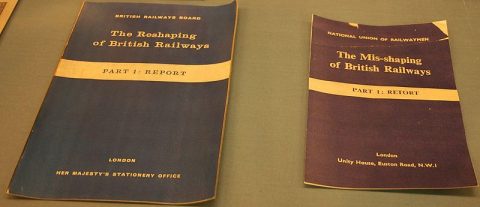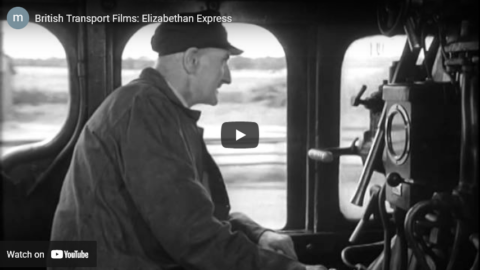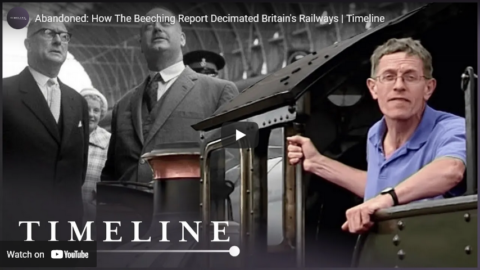Jago Hazzard
Published Apr 21, 2024Moving forward or indecision?
July 31, 2024
The History of the British Rail Symbol
January 22, 2024
Nationalization of British Railways: What Went Wrong?
Railways Explained
Published 22 Oct 2023In today’s video we continue uncovering the story of railway development in Great Britain, as part of a special trilogy marking the Railways Explained’s achievement of 100,000 subscribers!
This is actually the second video in series, and it covers a period from the aftermath of World War II to the momentous era of rail privatization, which was quite challenging period for British railways, full of ups and downs, but it is mostly marked by the formidable challenges.
We talked about the pivotal moments, such as the birth of British Railways, the ambitious Modernisation Plan, the influential Beeching Report, structural reforms, and the eventual transition to rail privatization, which all defined the British railways during this transformative period.
This insightful journey through time illuminates the intricacies and milestones of a railway system that has left an indelible mark on the United Kingdom’s transportation history.
(more…)
December 19, 2023
Overthinking Thomas the Tank Engine: What Actually Is Thomas?
Jago Hazzard
Published 13 Aug 2023Peep peep!
(more…)
November 15, 2023
The Future of Railways (circa 1961)
Jago Hazzard
Published 26 Jul 2023The future is slightly dingy.
(more…)
October 26, 2023
Look at Life – Draw the Fires (1963)
PauliosVids
Published 21 Nov 2018The railways are changing, with coal-powered steam being phased out and replaced by diesel engines by 1972. Crowds pay their respects to the Flying Scotsman‘s last departure from Kings Cross as it is replaced by a 3,300-horsepower diesel. The network is being modernised by new signalling, longer continuous track on concrete sleepers and flyovers, and controversial closures of lines.
September 21, 2023
This is York
Jago Hazzard
Published 28 May 2023“Make all the railways come to York!”
(more…)
May 4, 2023
Why British train enthusiasts hate this man – Dr. Beeching’s Railway Axe
Train of Thought
Published 27 Jan 2023In today’s video, we take a look at one Doctor Richard Beeching, the man who ripped up a third of Britain’s railways with nothing but a pen and paper.
April 13, 2023
Beeching plus 60
In The Critic, Peter Caddick-Adams notes that it’s just past 60 years since one of the most controversial documents the British government published during the latter half of the 20th century: The Beeching Report.

The British Railways Board’s publication The Reshaping of British Railways, Part 1: Report, Beeching’s first report, which famously recommended the closure of many uneconomic British railway lines. Many of the closures were implemented. This copy is displayed at the National Railway Museum in York beside a copy of the National Union of Railwaymen’s published response, The Mis-shaping of British Railways, Part 1: Retort.
Photo by RobertG via Wikimedia Commons.
Wednesday, 27 March 1963 marked the day when a civil servant with a doctorate in physics, seconded from ICI, proudly flourished a report he had written. That man was Dr Richard Beeching, and the result of his recommendations contained in The Reshaping of British Railways are with us to this day.
Beeching identified many unprofitable rail services and suggested the widespread elimination of a huge number of routes. He identified 2,363 stations for closure, along with 6,000 miles of track — a third of the existing network — with the loss of 67,700 jobs. His stated aim was to prune the railway system back into a profitable concern. Behind Beeching, seconded to the newly-established British Railways Board, stood the figure of the publisher-turned-Prime Minister, Harold Macmillan. He knew a thing or two about railways, having been a pre-nationalisation director of the Great Western Railway. It put him in the delightful position of never having to pay for a train ticket.
Macmillan observed from a shareholder’s point of view, “you can pour all in money you want, but you can never make the damned things pay for themselves”. In his view, the railway network and infrastructure of wagon works, tiny branch lines, cottages for signallers, crossings keepers and station masters, with most halts staffed 18 hours a day, amounted to a social service, albeit an expensive one. It had made the prosperity of Victorian Britain possible and was sustaining it still. From nationalisation in 1948, the railways themselves had attempted to make savings, closing 3,000 miles of track and reducing staff from 648,000 to 474,000. That famous Ealing comedy film of 1953, The Titfield Thunderbolt, about a group of villagers trying to keep their branch line operating after British Railways decided to close it, already reflected concern and railway nostalgia.
Britain’s literary and celluloid love affair with iron rails and steam began as long ago as 1905 with the publication of Edith Nesbit’s The Railway Children, a success which peaked when the book was made into a highly successful movie in 1970. Meanwhile, professional sleuths and loafers like Sherlock Holmes, Bulldog Drummond, Lord Peter Wimsey, Hercule Poirot and Bertie Wooster capitalised on the branch line network in their methodology of moving swiftly about pastoral England in their hunts for miscreants. It was the success of The Lady Vanishes, a 1938 mystery thriller set on a continental train, that launched Alfred Hitchcock as a world-class director. David Lean’s Brief Encounter of 1945, based on Noël Coward’s earlier one-act play, Still Life, attached deep romance to station platforms and waiting rooms, reminiscent of so much heartache in the recently fought world war. It is still regarded as one of the greatest of all British-made films. None of this mattered to Beeching, the man who was “Britain’s most-hated civil servant” at his death in 1985, a moniker still used today.
There’s an argument that Beeching was deliberately set up as a patsy for the real villains, Ernest Marples and Harold MacMillan:
The cold, dispassionate Beeching was absolutely the wrong man for the job. As he told the Daily Mirror at the time, “I have no experience of railways, except as a passenger. So, I am not a practical railwayman. But I am a very practical man.” John Betjeman, writing persuasively and eloquently in the Daily Telegraph each week, and later Ian Hislop, hit the right note in observing that Beeching, and all he stood for were technocrats. They “weren’t open to arguments of romantic notions of rural England, or the warp-and-weft of the train in our national identity. They didn’t buy any of that, and went for a straightforward profit and loss approach, from which we are still reeling today”.
However, it has also been argued that Beeching was the unwitting fall-guy for the Minister of Transport of the day, Ernest Marples. He was a self-made businessman who “got things done”, but he retained an air of shadiness about him. Macmillan should have known better. Marples had been managing director of Marples Ridgway, awarded contracts to build the first motorways. When challenged about a conflict of interest, he sold his 80 per cent shareholding to his wife. Elevated to the peerage, Marples fled to Monaco in 1975 to avoid prosecution for tax fraud. So, in some ways, the thing was a stitch-up. Marples directly benefited from the widespread cuts advocated by his subordinate, Beeching. Macmillan had his eye off the ball and was already considering retirement, hastened by an operation for prostate cancer six months after Beeching’s report.
The Prime Minister was astute enough to ensure the press presented the cuts in a positive way, however. From the Cabinet papers of the day, we now know the day before the publication of The Reshaping of British Railways, Beeching’s findings were rewritten to suggest the cuts were the first phase of a co-ordinated national transport policy, with advanced plans to replace the axed rail networks with improved minor roads and local bus services. In reality this was political fantasy (my inner lawyer cautions against more extremist language), for the bus-road subsidy would have cost more than that already paid to the railways. The promise of replacement bus services should have come with a guarantee of remaining in place for at least 10-15 years, because most were withdrawn after two, forcing more motor traffic onto an already inadequate road network.
February 28, 2023
The strange Steam Locomotive that was built like a Diesel – SR Leader Class
Train of Thought
Published 4 Nov 2022In today’s video, we take a look at the Southern Railway “Leader” locomotive that was built like a diesel, powered by steam and had a lot pros and cons.
(more…)
September 13, 2022
Down the Line – A look into the legacy of the cuts made to the rail network by Doctor Beeching (2008)
Kevin Birch
Published 29 Jul 2013Joe Crowley meets the people who battled to save their local railway lines in the South of England in the 1960’s.
First aired on BBC One 26th October 2008
July 11, 2022
British Transport Films: Elizabethan Express (1954)
mikeknell
Published 6 May 2014This 1954 documentary is uploaded in a couple of places, but here it is without breaks and in the correct aspect ratio. One of the classic railway films.
March 29, 2022
Abandoned: How The Beeching Report Decimated Britain’s Railways | Timeline
Timeline – World History Documentaries
Published 15 May 2019Travel journalist Simon Calder takes a journey from across the south of England — by bike, rail and car. In this documentary film, Simon explores the legacy of the Beeching railway cuts. He examines the arguments for reopening some of the branch lines axed in the 1960s.
It’s like Netflix for history … Sign up to History Hit, the world’s best history documentary service, at a huge discount using the code ‘
TIMELINE‘ —ᐳ http://bit.ly/3a7ambuYou can find more from us on:
https://www.instagram.com/timelineWH
This channel is part of the History Hit Network. Any queries, please contact owned-enquiries@littledotstudios.com
January 28, 2022
How a holiday camp accidentally helped save eight steam engines – Butlin’s Steam Engines
Train of Thought
Published 22 Oct 2021In this video, we take a look at how a British holiday camp managed to help save some very rare express engines, possibly by accident …
This video falls under the fair use act of 1976
October 18, 2021
QotD: Harold Macmillan’s “Gold Pass” on British Railways
One of my worst and most embarrassing failures as a journalist was my attempt to interview Harold Macmillan, the former British prime minister. It happened on a train near Cambridge. He was 83. I was 26. He physically fought me off, declaring in a quavering voice, “I don’t want to be interviewed; I’m much too old for that sort of thing,” as he jabbed fiercely (and quite painfully) at me with his gnarled walking stick.
Too old? Just a few years later that same wily showman drove a memorable stiletto into Margaret Thatcher’s ribs, using the same falsely quavering voice to attack her policy of selling off national assets. But I remember the humiliating occasion of my failed interview for another reason. Macmillan was able to drive me away partly because he was occupying an entire first-class compartment, reserved for him personally, on the London express. Compartments — oh, how I miss them — had sliding doors, which cut them off from the rest of the train. You could even pull the blinds down between you and the corridor. They could be marvelous private spaces for all kinds of purposes on long journeys. But you had to be lucky to get one to yourself. Once the ex-premier had driven me out, he was safe.
But Macmillan (who in those days had not given into vanity and accepted a peerage) did not have to be lucky. He had once been a director of the Great Western Railway, which had been taken into state ownership in the 1940s. So to the end of his life (in compensation for his lost power) he possessed a magical shiny token called a Gold Pass. This entitled him to free first-class travel, without limit, on any train in Great Britain. It was even rumored that it gave him the power to have trains stopped for him at stations where they did not normally halt. I often thought I would rather have such a pass than be prime minister.
Peter Hitchens, “Why I Love Trains”, First Things, 2020-07-16.
September 6, 2021
Why the British Rail Modernisation Plan Failed
Ruairidh MacVeigh
Published 27 Feb 2021Hello again!
Back to trains, and for this week we discuss one of Britain’s most audacious but ultimately futile projects to revitalise the network in the wake of World War II. However, rather than undertaking a comprehensive rebuild of the network, British Railways was short-changed time and again, ultimately resulting in a facelifted but largely unchanged system that dated back to the Victorian era, though it was much smaller and crippled by far more debt than ever before.
This video was actually a suggestion from an American viewer, who was curious as to why British Rail had such a vast array of diesel locomotives during its early years.
All video content and images in this production have been provided with permission wherever possible. While I endeavour to ensure that all accreditations properly name the original creator, some of my sources do not list them as they are usually provided by other, unrelated YouTubers. Therefore, if I have mistakenly put the accreditation of “Unknown”, and you are aware of the original creator, please send me a personal message at my Gmail (this is more effective than comments as I am often unable to read all of them): rorymacveigh@gmail.com
The views and opinions expressed in this video are my personal appraisal and are not the views and opinions of any of these individuals or bodies who have kindly supplied me with footage and images.
If you enjoyed this video, why not leave a like, and consider subscribing for more great content coming soon.
Thanks again, everyone, and enjoy!
References:
– Railways Archive (and their respective sources)
– RMWeb (and their respective sources)
– Wikipedia (and its respective references)









